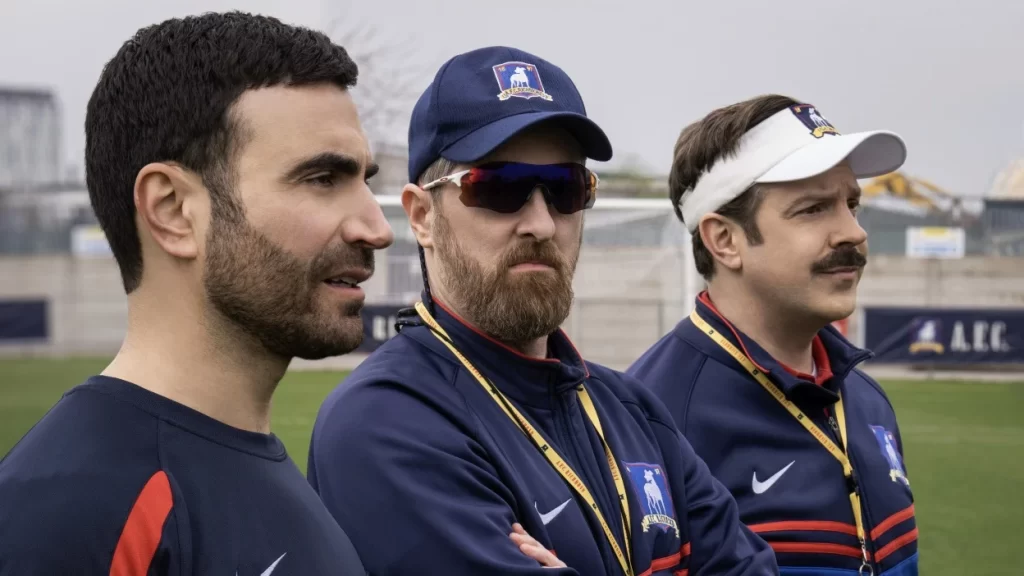Ted Lasso, television’s favorite character and the show that everyone can’t help but love, just released its third and final season. It’s the show that redefined comedy with its witty remarks and uncountable Gen X references. It’s the show where everyone is laughing but no one is being laughed at.
The 90’s had F.R.I.E.N.D.S, the 2000’s had How I Met Your Mother, the 2010’s had “The Good Place” and now it’s safe to assume the 2020’s have their own quintessential feel-good show they can watch- Ted Lasso. I’d say Ted Lasso is therapy in 30 minutes. However, the last season had much longer episodes with each one crossing over an hour.
Season 3 is one of its most grounded and realistic seasons yet. This season had shown an early indication of ending in its first scene. The slight melancholia along with the gloomier color palette insinuated that the ending was going to be bittersweet. Jason Sudeikis has been very open about this being the show’s last season. Ted’s son misses him. He can’t be an absent father. He has to go back.
But on a brighter note, every concern is addressed, and every loose end is tied.
Every character gets to find their purpose. Although it is sad to say goodbye, it is better that the show doesn’t overstay its welcome and meets its natural ending.
Many of the main characters get their own individual episodes; Jamie, Keeley, Colin, Sam, Rebecca, Coach Beard, Nathan and even Trent Crimm. We follow their story and understand their motivations, frustrations, secrets, and sadness. Although Ted Lasso is the titular character, it has never been about just him. It’s about being a better version of ourselves and a bond that lasts a lifetime. Every character gets a chance to redefine their story. It’s a story of second chances and to our relief, they always take it.

I love this show because while there are many points where it could have gone wrong, it simply doesn’t because of how the characters handle it with empathy, forgiveness, and understanding. Ted’s son misses him but he understands the team needs him. He never gets angry at him for it. The team is able to do this because they are coached by a person who knows how much more important it is to learn to believe in themselves, to be a better person, and to love themselves more than it is to win.
Allow me to take this opportunity to include one of my absolute favorite quotes from season 1:
“Rebecca: Oh, do you believe in ghosts, Ted?
Ted: I do. But more importantly, I believe they need to believe in themselves”
The soul of the show is, undeniably, Ted Lasso. Jason Sudeikis has written and given life a ray of sunshine in human form and it is the thread that ties everyone together. The coach that everyone needs in their life. But is all this positivity- an overcompensation for something unresolved? In this season, we see him outside the lens of an overly optimistic motivational football coach. He is a human with his own demons. We see him struggle with confronting his own feelings until he finally gives in and opens up to his therapist at the end of season 2.
In season 3, we are introduced to Ted’s mother to see why he is so afraid to open up. We see the woman behind this overly enthusiastic, optimistic person with a heart of gold. But we also see the woman behind the skeptic man who is wary of facing their deepest scars and uses humor to suppress them. A lot of Ted’s qualities start to make sense when we get to know his mother.
The show does a great job of showing the generational trauma perpetuated by emotionally-constipated parents. Said parents make up for it with forced jokes and laughter, hoping that by not addressing the elephant in the room would make everything okay. It begs to ask whether the transgenerational cycle ever ends and more importantly, how does it?
Season 2 had ended on a rough note. Nathan, the Wonder Kid, prepares for revenge with Richmond’s rival team West Ham. West Ham is a “typical” sports team. There are condescending tones, rebukes over mistakes, and in the worst case, yelling and shoving each other in the field. This creates a mob of frustrated and angry players who go all the wrong ways about expressing their feelings and release that aggression on the field. They become good players but deeply unhappy humans.
But here comes Ted Lasso with his Lasso way. The complete opposite of everything West Ham stands for. With his determination, optimism, lack of knowledge about the game, and of course, the core belief that we can do it but even if we don’t, things will work out in the end. He brings the underdogs to the top of their game and changes their entire belief system.
Ted Lasso is infectious and heartwarming. It will make you laugh and cry and force you to think.
With season 3, they don’t go overboard with positivity and address real human emotions. It is a perfect, profound and bittersweet way of saying goodbye to the show. And it is safe to assume that it will be deemed a classic for years to come.